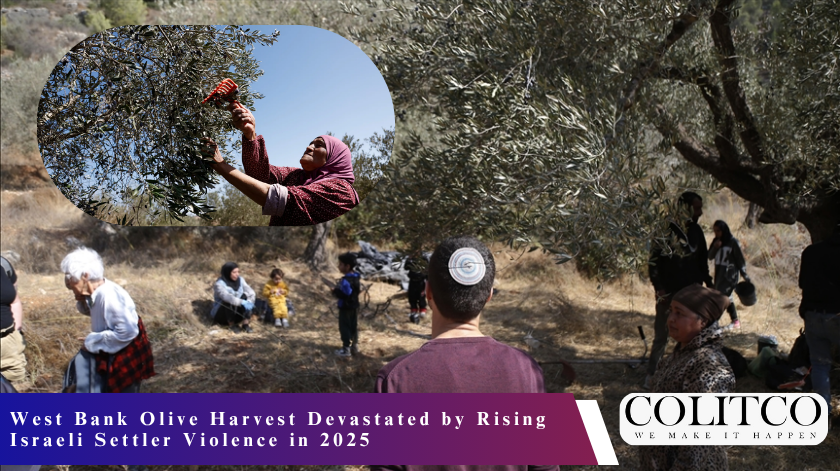The 2025 olive harvest in the occupied West Bank has become a time of fear and loss. Once a festival of community, family and cultural pride, this has turned into a battlefield scarred by West Bank settler violence 2025 that risks not just the livelihoods of farmers but also the identity of a people who are inextricably connected to their land.
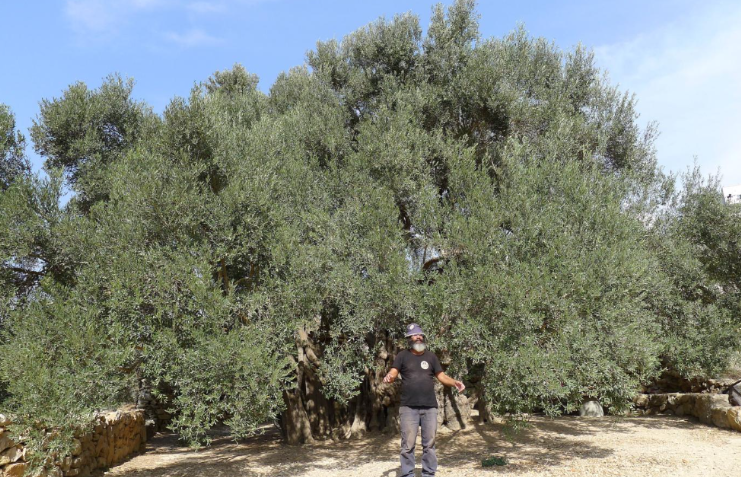
Figure 1: A farmer stands beneath an ancient olive tree
Palestinian farmers rely on the cultivation of olives, but they are now exposed to repeated attacks, having their access to groves blocked and their trees widely destroyed. The symbolic olive tree, a symbol of peace and perseverance, is being stripped both of its fruit and meaning as tensions rise.
Palestinian Olive Harvest Violence Intensifies
In rural towns ranging from Nablus to the Jordan Valley, Palestinian olive pickers have described relentless harassment. The UN Office for the Coordination of Humanitarian Affairs (OCHA) documented 264 settler attacks in October 2025, the highest monthly number since records began in 2006.
That’s eight incidents every day, according to video evidence that has gone viral on the Internet, showing masked settlers attacking farmers and burning trees and olive groves.
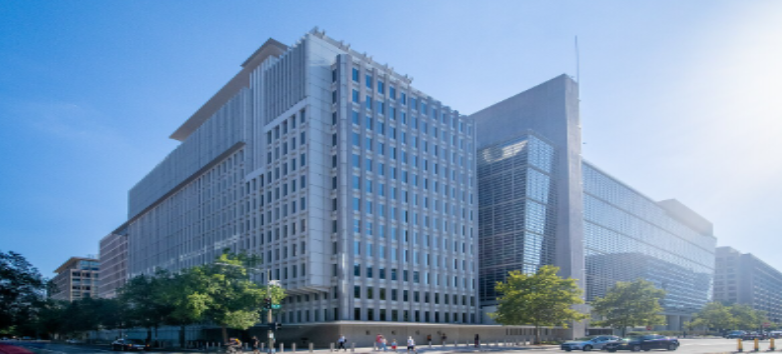
Figure 2: The World Bank headquarters in Washington, D.C
The Colonisation and Wall Resistance Commission (CWRC) also reported that settlers and Israeli forces carried out 766 attacks across the West Bank in October alone. At least 4,000 olive trees and saplings have been vandalised in Palestinian olive harvest violence, while many groves were set ablaze or fenced off as
“We return every year to find fewer trees, more checkpoints, and more fear,” said farmer Shukry Shehadeh from Hamra village, who lost decades of harvest when settlers grazed cattle on his farmland.
Human Toll and Growing Impunity Amid West Bank Settler Violence 2025
An escalating level of Palestinian olive harvest violence and a disturbing lack of accountability. Human rights groups and witnesses say Israeli troops are frequently present during the attacks, intercepting stones thrown by Palestinians but not settlers, sometimes even coming to the aid of the settlers rather than halting them.
The Israel Defence Forces (IDF) responded that such conduct “is not in line with IDF values” and that incidents “will be examined and addressed disciplinarily.” But for most Palestinians, that assurance feels hollow.

Figure 3: Security personnel during a field briefing
Tom Fletcher, the UN Humanitarian Relief Chief, described the “failure to prevent or punish such attacks” as being at odds with international law. He called on Israel to protect civilians and act in accordance with its responsibilities as an occupying power.
In reality, though, many Palestinian families are leaving their land entirely. The OCHA estimates that more than 3,200 Palestinians have been displaced due to settler violence and related restrictions since October 2023.
Olive Trees: The Lifeblood of Palestinian Livelihoods
Olive trees are not only crops, they are history. Palestinian communities have relied on them for income and identity for centuries. The olive and oil industry sustains nearly 100 thousand families in the West Bank, and it contributes to up to 14% of farm income, according to the Palestinian Ministry of Agriculture.
But this year, production has plunged. Entire hillsides once thick with green are now skeletal with charred stumps and broken branches. Many farmers cannot even reach their trees due to military restrictions.
Israeli settler attacks West Bank, and the International Committee of the Red Cross (ICRC) warns that the ongoing violence is destroying not only the harvest but also future yields. Olive trees take years to mature, and once destroyed, they cannot be quickly replaced.
“The olive tree is livelihood and lineage,” said Ajith Sunghay, Head of OHCHR’s Office in the Occupied Palestinian Territory. “When it is cut down, a whole family’s history is severed.”
Crisis Deepens as Settlement Expansion Accelerates
The increase in West Bank settler violence 2025 has occurred along with Israel’s ramping up of settlement growth throughout the occupied territory. Already in September 2025, Israeli Prime Minister Benjamin Netanyahu exclaimed that Israel had “doubled Jewish settlements” in the West Bank.
Humanitarian organisations warn that this expansion, coupled with increasing settler attacks, is part of a broader effort to push Palestinians off their land.
Many activists describe it as “de facto annexation”, a slow, administrative takeover that undermines any future for a Palestinian state.
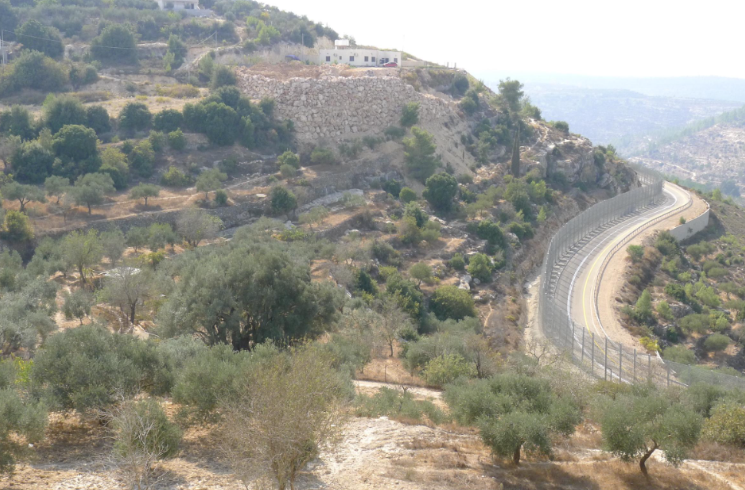
Figure 4: Olive groves and a separation barrier seen winding through the hills
“Each uprooted tree is a message that Palestinians are unwelcome on their own land,” said Yehuda Shaul, an Israeli human rights activist with Rabbis for Human Rights.
Impact of West Bank Settler Violence 2025 on Olive Production
Agricultural analysts estimate that the blow to the olive harvest in 2025 could reduce overall olive oil production by as much as 35% from last year, raising prices and affecting regional exports. Since the average production of olive oil in the West Bank is some 15,000-20,000 metric tons per year, any decrease at all has significant economic consequences.
Ongoing West Bank settler violence 2025 could cause Palestinian agricultural revenues to shrink by some USD 25 million annually if the violence continues until 2026, according to Food and Agriculture Organisation (FAO) estimates.
Global Reaction and Calls for Accountability
The United Nations and European Union have called for “immediate restraint” and accountability for perpetrators of settler attacks. Yet, despite condemnations, on-the-ground enforcement remains minimal.
Humanitarian agencies are urging Israel to dismantle illegal outposts and ensure safe access for Palestinian farmers during the harvest season.
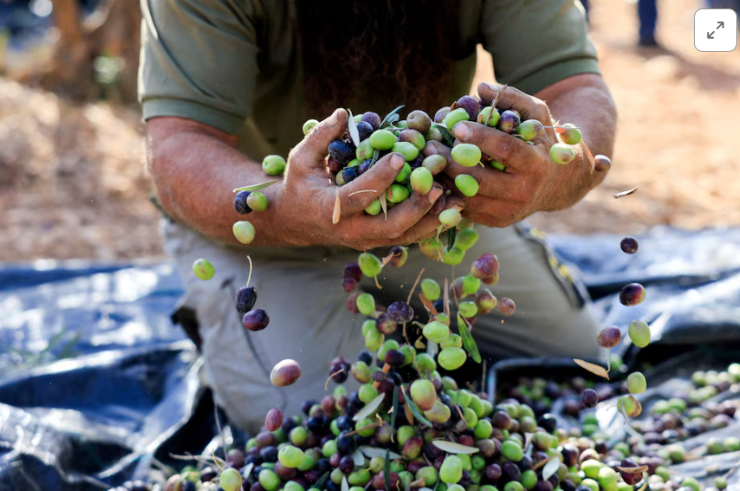
Figure 5: A farmer sorts freshly picked olives
Meanwhile, volunteers, including Israeli and Jewish activists, continue to accompany Palestinian farmers during harvest days, often facing the same violence and detentions.
Two Jewish-American volunteers working with Rabbis for Human Rights were deported in October after joining farmers in the village of Burin. Rights groups call this part of a growing crackdown on civil solidarity movements within Israel itself.
Resilience Amid Ruin: Farmers Hold On
Despite the hardships, many Palestinian farmers refuse to give up. In the Jordan Valley, a 72-year-old visits her grove, tending to the few remaining trees.
“They’ve broken our branches, but not our spirit,” she said. “I will remain here beneath my olives. I won’t leave.”
Her words echo a sentiment shared by thousands of Palestinians, one of endurance and belonging even amid relentless pressure.
Market Risks and Future Prospects
The world olive oil market is expanding at a rate of progress that will lead to an estimated value of USD 16 billion by 2030, with Europe and Asia accounting for the demand. But instability in the West Bank could disrupt supply chains and impact exports of artisanal oil.
If allowed to proceed, potential West Bank settlers violence 2025 would bring Palestinian agriculture closer to the edge, likely resulting in an irrevocable process of traditional knowledge and farmers’ wisdom from centuries past.

